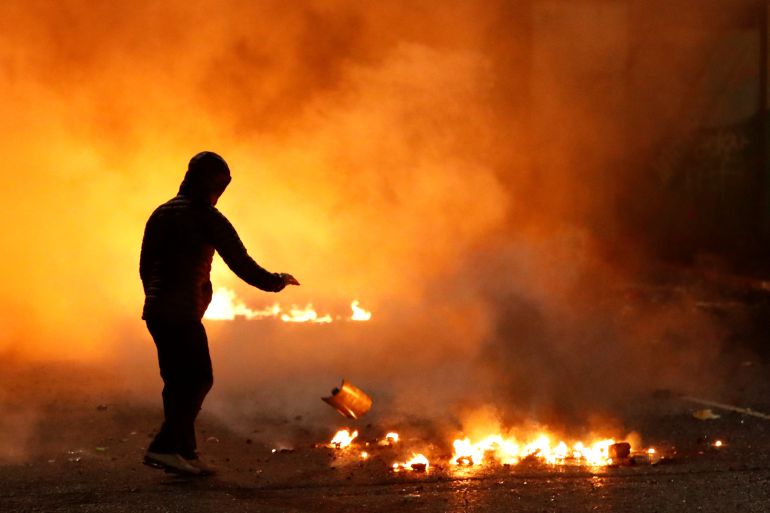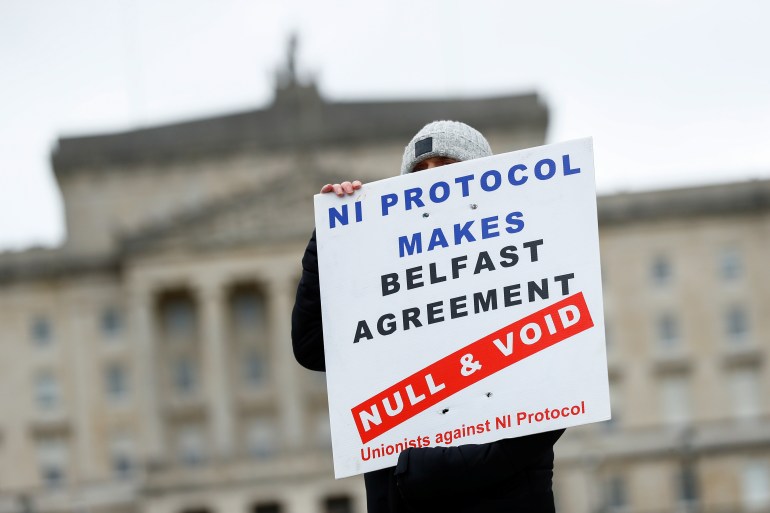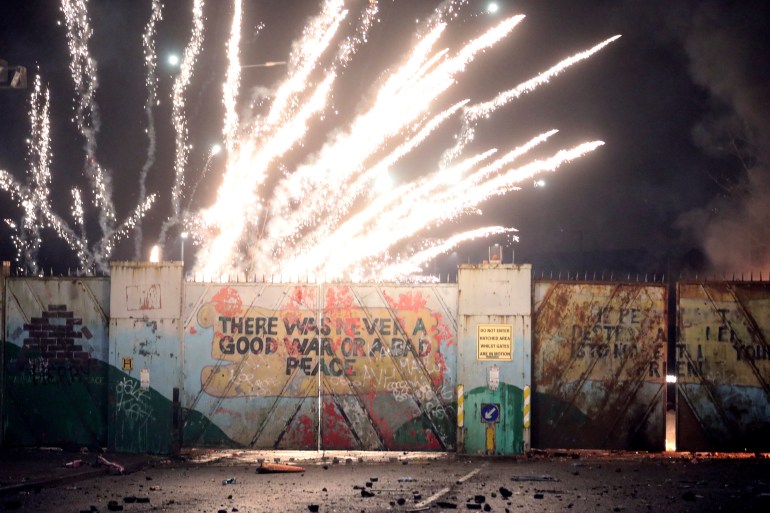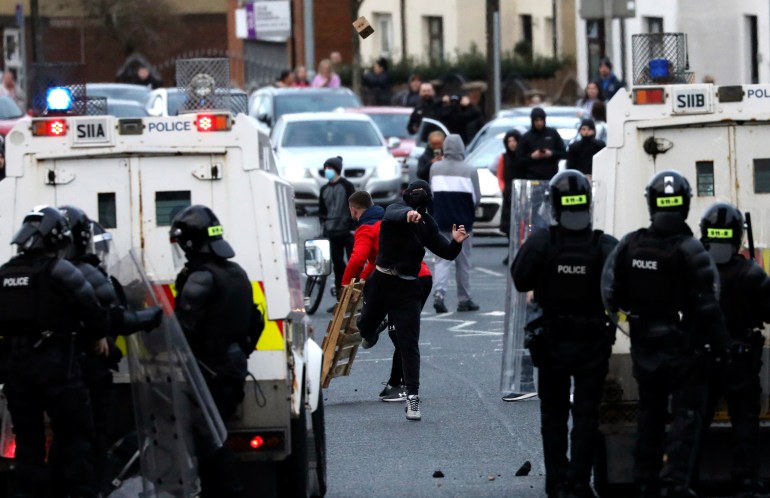Northern Ireland unrest: Four key questions answered
Long-simmering tensions have been brought to the boil by Brexit.

Northern Ireland’s devolved government put aside factional differences on Thursday to appeal for calm amid an outbreak of unrest, as Brexit shakes a fragile political balance in the region.
On Wednesday evening, rioters hijacked and torched a bus and hurled petrol bombs at police in the capital, Belfast. The scenes marked a tenth day of sporadic violence. Several police officers were injured.
Keep reading
list of 4 itemsUS will not take sides on UK-EU Northern Ireland rift: Official
In Northern Ireland, a ‘shift in enthusiasm’ for Irish unity
Northern Ireland’s Foster accuses EU of disregarding peace deal
Addressing the violence in a statement, Northern Ireland’s compulsory coalition government said it was “gravely concerned”, adding: “While our political positions are very different on many issues, we are all united in our support for law and order and we collectively state our support for policing.”
The recent turmoil comes as frustration grows among pro-British unionists at new post-Brexit trade barriers between Northern Ireland and the rest of the United Kingdom.
The tensions have raised concerns over the political stability of Northern Ireland, which was beset by decades of violence before a 1998 peace agreement ended fighting between mostly Catholic nationalists pushing for a united Ireland and mostly Protestant unionists, or loyalists, who wanted Northern Ireland to remain part of the UK.
More than 3,600 people were killed in the conflict, which erupted in the late 1960s and involved Irish republicans, unionists and UK armed forces.
Here is what you should know about the latest events:
What is behind the current tension?
The UK’s economic split from the European Union at the end of 2020 has disturbed the delicate political balance in Northern Ireland, despite attempts to avoid such an outcome.
Preserving peace in Northern Ireland without allowing the UK a back door into the EU’s markets through the 310-mile (500km) UK-Irish land border was one of the thorniest issues of Brexit divorce talks.
The arrangement eventually hammered out by London and Brussels was designed to avoid checks between Northern Ireland and Ireland, an EU member, because an open border on the island has helped underpin the peace process built on the 1998 Good Friday accord.
But contentiously, the Brexit divorce deal did lead to customs and border checks imposed on some goods moving between Northern Ireland and the remainder of the UK under the controversial Northern Ireland Protocol, which effectively created a border in the Irish Sea and has raised the ire of unionists.

The checks have created problems with the importation of a range of goods into the region. Businesses have warned they are struggling to cope with the new red tape.
At the beginning of March, Northern Irish loyalist paramilitary groups withdrew their support for the 1998 peace agreement due to concerns over the Brexit deal’s implications for the region, and pledged to oppose it by “peaceful and democratic” means.
The coalition of groups informed British Prime Minister Boris Johnson that they would not back the Belfast Agreement again until the Northern Ireland Protocol was amended to ensure unfettered trade between Northern Ireland and the rest of the UK.
Why are there riots?
The recent violence, which has largely taken place in unionist areas, has flared as tensions over Northern Ireland’s post-Brexit trade rules rise, and as the accompanying economic disruption afflicts the region.
It also comes against the backdrop of worsening relations between the leading parties in the local power-sharing government.
The pro-British Democratic Unionist Party (DUP) of First Minister Arlene Foster attributes the unrest to anger over the Irish Sea Border and a decision by police not to prosecute senior members of the Irish nationalist Sinn Fein party for attending a lockdown-breaking funeral for former Irish Republican Army commander Bobby Storey.

The DUP and other unionist parties have demanded the resignation of Northern Ireland’s police chief over the controversy.
But Sinn Fein and other critics have accused the DUP of stoking tensions with their opposition to the new trading arrangements.
What happened in the unrest?
The violence on Wednesday took place near a so-called “peace wall” separating the unionist Shankill Road area from a nearby Irish nationalist stronghold, where groups of young people also gathered.
The walls and fences were built between the two communities to prevent clashes during the three decades of violence in Northern Ireland, commonly known as The Troubles.
Police Service of Northern Ireland Assistant Chief Constable Jonathan Roberts said several hundred people gathered on both sides of a gate in the wall, where “crowds … were committing serious criminal offences, both attacking police and attacking each other”.
He added it was likely that paramilitary organisations were involved in the violence.

The latest disturbances followed riots over the Easter weekend in unionist areas in and around Belfast and Londonderry, also known as Derry, that saw cars set on fire and projectiles and petrol bombs hurled at police officers.
Roberts said a total of 55 police officers had been injured over the several nights of disorder.
How have officials reacted?
Northern Irish politicians across the spectrum condemned the violence, which Foster branded “unjustified & unjustifiable”.
“Those responsible must be subject to the full rigour of the law,” she tweeted.
I have spoken with the Chief Constable as he briefs political parties. Thoughts are particularly with those officers injured by the unjustified & unjustifiable violence of recent days.Those responsible must be subject to the full rigour of the law.All must be equal under the law.
— Arlene Foster #WeWillMeetAgain (@DUPleader) April 8, 2021
Deputy First Minister Michelle O’Neill of Sinn Fein also denounced the disorder and the attacks on police.
British Prime Minister Boris Johnson appealed for calm, saying “the way to resolve differences is through dialogue, not violence or criminality”.
“I am deeply concerned by the scenes of violence in Northern Ireland,” he tweeted, citing the bus hijacking and an attack on a photojournalist from the Belfast Telegraph newspaper.
I am deeply concerned by the scenes of violence in Northern Ireland, especially attacks on PSNI who are protecting the public and businesses, attacks on a bus driver and the assault of a journalist. The way to resolve differences is through dialogue, not violence or criminality.
— Boris Johnson (@BorisJohnson) April 7, 2021
Irish Foreign Minister Simon Coveney told the national broadcaster RTE: “This needs to stop before somebody is killed or seriously injured.
“These are scenes we haven’t seen in Northern Ireland for a very long time, they are scenes that many people thought were consigned to history and I think there needs to be a collective effort to try to diffuse tension.”